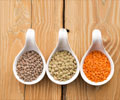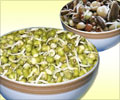Highlights
- Legumes are a group of low-energy, nutrient-dense and low glycemic index food.
- Legumes are widely recommended in diabetic diets, even though there is little evidence that their consumption protects against type 2 diabetes.
- A frequent consumption of legumes, particularly lentils may provide benefits on type 2 diabetes prevention in older adults at high cardiovascular risk.
Legumes are a food group rich in B vitamins, contain different beneficial minerals (calcium, potassium and magnesium) and sizeable amounts of fibre and are regarded as a low-glycemic index food, which means that blood glucose levels increase only slowly after consumption.
Eating legumes regularly can help improve human health. In fact, the Food and Agriculture Organization of the United Nations (FAO) declared 2016 as the international year of legumes to raise people's awareness of their nutritional benefits.
Legumes Help Manage Blood Glucose Levels
To increase the general level of knowledge in this area, researchers from the URV's Human Nutrition Unit in collaboration with other research groups in the PREDIMED study evaluated the association between the consumption of the different sub-types of non-soy legumes and the risk of type 2 diabetes among individuals at high cardiovascular risk.
Researchers analysed 3349 participants at high risk of cardiovascular disease but without type 2 diabetes at the beginning of the PREDIMED study.
Of the different subtypes of legume, lentils in particular were associated with a lower risk of type 2 diabetes. Those participants who had a higher consumption of lentils during the follow-up (nearly 1 serving/week) compare to those individuals with a lower consumption (less than half a serving per week), had a 33% lower risk of developing the disease.
Possible Effect of Lentils
- Lentils can be beneficial for diabetics as it helps to balance blood sugar levels and reduce plasma glucose.
- High fiber and protein diet help to prevent blood glucose spikes after meals. Lentils are a rich source of easily digestible protein.
- Plant protein helps kidneys to flush out high levels of blood sugar.
- Protein and fiber intake slows the digestion, whereby insulin is released gradually and healthy glucose levels are maintained.
The researchers highlight the importance of consuming legumes to prevent chronic diseases such as diabetes, but state that further research must be conducted in other populations to confirm these results.
Reference
- Nerea Becerra-Tomás et al., Legume consumption is inversely associated with type 2 diabetes incidence in adults: a prospective assessment from the PREDIMED study, Clinical Nutrition (2017) http://dx.doi.org/10.1016/j.clnu.2017.03.015.
Source-Medindia
















